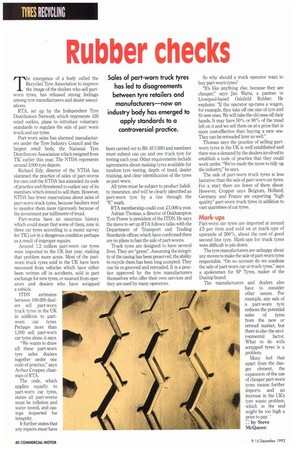Rubber checks
Page 42

If you've noticed an error in this article please click here to report it so we can fix it.
Sales of part-worn truck tyres has led to disagreements between tyre retailers and manufacturers—now an industry body has emerged to apply standards to a controversial practice.
Ttie emergence of a body called the Recycled Tyre Association to improve he image of the dealers who sell partworn tyres, has released strong feelings among tyre manufacturers and dealer associations.
RTA, set up by the Independent Tyre Distributors Network which represents 420 retail outlets, plans to introduce voluntary standards to regulate the sale of part worn truck and car tyres.
Part-worn sales has alarmed manufacturers under the Tyre Industry Council and the largest retail body, the National Tyre Distributors Association which resigned from TIC earlier this year. The NTDA represents around 3,000 tyre depots.
Richard Edy, director of the NTDA has slammed the practice of sales of part-worns for cars and the NTDA has amended its code of practice and threatened to outlaw any of its members which intend to sell them. However, NTDA has fewer reservations about sales of part-worn truck tyres, because hauliers tend to monitor them more rigorously because of the investment per millimetre of tread.
Part-worns have an uncertain history which could mean that some of them, (one in three car tyres according to a recent survey for TIC) are in a dangerous condition perhaps as a result of improper repairs.
Around 1.2 million part-worn car tyres were imported to the UK last year, making that problem more acute. Most of the partworn truck tyres sold in the UK have been recovered from vehicles which have either been written off in accidents, sold in part exchange for new tyres, or sourced from operators and dealers who have scrapped a vehicle.
ITDN estimates between 100-200 dealers sell part-worn truck tyres in the UK in addition to partworn car tyres. Perhaps more than 1,000 sell part-worn car tyres alone, it says.
"We wants to draw all these part-worn tyre sales dealers together under one code of practice," says Arthur Cropper, chairman of RTA.
The code, which applies equally to part-worn car tyres, states all part-worns must be inflation and water tested, and casings inspected for integrity; It further states that any repairs must have been carried out to BS AU159D and members must submit one car and one truck tyre for testing each year. Other requirements include agreements about making tyres available for random tyre testing, depth of tread, dealer training, and clear identification of the tyres as part worn.
All tyres must be subject to product liability insurance, and will be clearly identified as part-worn tyre by a line through the "E" mark.
RTA membership could cost £1,000 a year.
Adrian Thomas, a director of Oakhampton Tyre Power is president of the ITDN. He says the move to set up RTA follows talks with the Department of Transport and Trading Standards offices which have confirmed there are no plans to ban the sale of part-worns.
Truck tyres are designed to have several lives. They are "green". Assuming the integrity of the casing has been preserved, the ability to recycle them has been long accepted. They can be re-grooved and retreaded. It is a practice approved by the tyre manufacturers themselves who offer their own services and they are used by many operators. So why should a truck operator want to buy part-worn tyres?
"It's like anything else, because they are cheaper," says Jim Watts, a partner in Liverpool-based Oakfield Rubber. He explains: "If the operator up-rates a wagon, for example, they take off one size of tyre and fit new ones. We will take the old ones off their hands. It may have 50% or 90% of the tread left on it and we sell them on at a price that is more cost-effective than buying a new one. They can be retreaded later as well."
Thomas says the practice of selling partworn tyres in the UK is well established and there was a demand by the dealers involved to establish a code of practice that they could work under. "We've made the move to tidy up the industry" he says.
The sale of part-worn truck tyres is less lucrative than the sale of part-worn car tyres. For a start there are fewer of them about. However, Cropper says Belgium, Holland, Germany and France are exporting "high quality" part-worn truck tyres in addition to vast quantities of car tyres.
Mark-ups
Part-worn car tyres are imported at around £5 per item and sold on at mark-ups of upwards of 300%, about the cost of good second line tyre. Mark-ups for truck tyres were difficult to pin down.
The tyre manufacturers are unhappy about any moves to make the sale of part-worn tyres respectable. "On no account do we condone the sale of part-worn car or truck tyres," says a spokesman for SP Tyres, maker of the Dunlop brand.
The manufacturers and dealers also have to consider other issues. For example, any sale of a part-worn tyre reduces the potential sales of tyres from the new or retread market, but there is also the environmental factor. What to do with scrapped tyres is a problem.
Many feel that apart from the danger element, the expansion of the use of cheaper part worn tyres means further imports and an increase in the UK's tyre waste problem, which in the end might be too high a price to Pay.'
by Steve McQueen


























































































